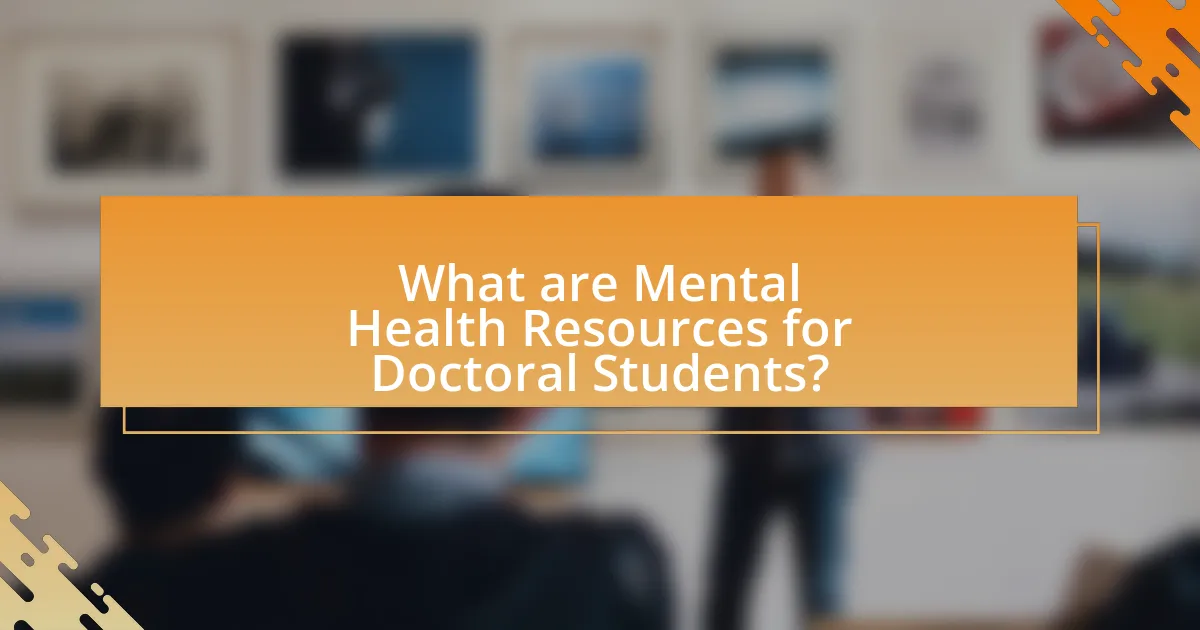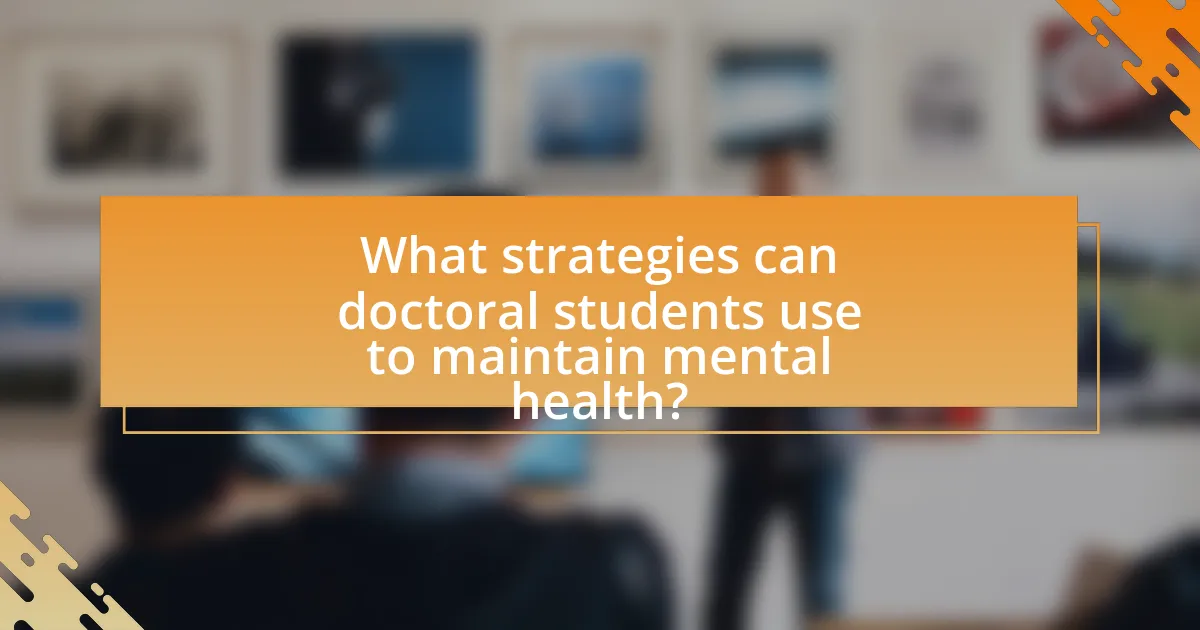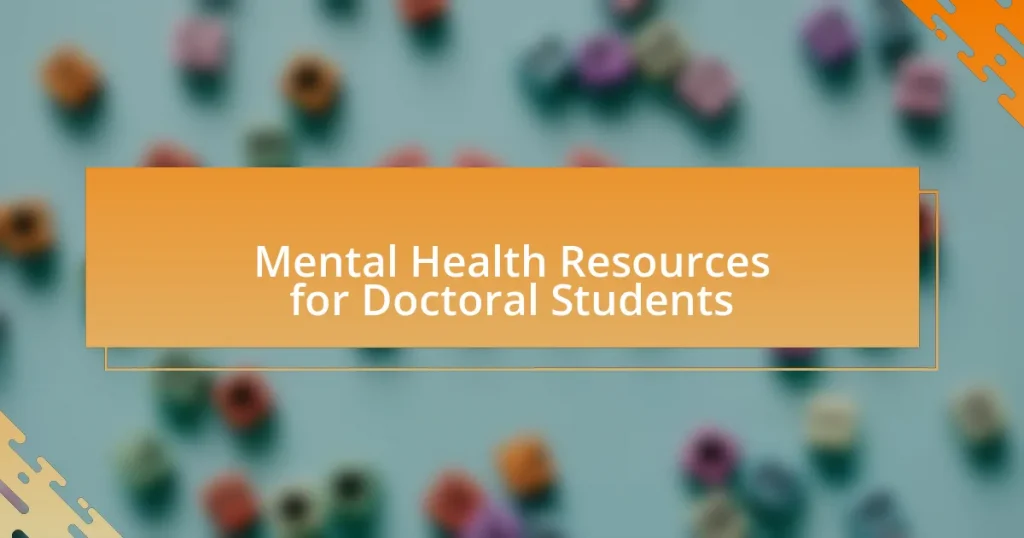Mental health resources for doctoral students encompass a range of services including counseling, peer support groups, hotlines, and wellness workshops, all aimed at addressing the unique stressors faced by this population. With approximately 40% of graduate students experiencing significant mental health issues, these resources are crucial for enhancing academic performance and overall well-being. University counseling services play a vital role in providing accessible support, while online platforms and peer networks further facilitate mental health management. The article explores the importance of mental health, the barriers to accessing resources, and effective strategies for maintaining mental well-being among doctoral students.

What are Mental Health Resources for Doctoral Students?
Mental health resources for doctoral students include counseling services, peer support groups, mental health hotlines, and wellness workshops. Universities often provide on-campus counseling centers staffed with licensed professionals who offer individual therapy, group therapy, and crisis intervention. For instance, the American Psychological Association reports that 30% of graduate students experience significant psychological distress, highlighting the importance of accessible mental health services. Additionally, many institutions facilitate peer support networks where students can share experiences and coping strategies, fostering a sense of community. Online resources, such as mental health apps and teletherapy options, further expand access to support, accommodating students’ varying schedules and needs.
Why is mental health important for doctoral students?
Mental health is crucial for doctoral students because it directly impacts their academic performance, emotional well-being, and overall quality of life. Research indicates that high levels of stress and anxiety are prevalent among doctoral students, with studies showing that approximately 40% experience significant mental health issues during their programs. Maintaining good mental health enables these students to manage the demands of rigorous research, coursework, and potential isolation, ultimately leading to higher completion rates and better academic outcomes.
What unique stressors do doctoral students face?
Doctoral students face unique stressors such as intense academic pressure, isolation, and uncertainty about their future careers. The rigorous demands of research, coursework, and the expectation to publish can lead to significant stress and anxiety. Additionally, many doctoral students experience feelings of isolation due to the solitary nature of their research and limited social interactions, which can exacerbate mental health issues. A study published in the journal “Nature Biotechnology” found that 39% of doctoral students reported experiencing anxiety, while 41% reported depression, highlighting the prevalence of mental health challenges in this population.
How can mental health impact academic performance?
Mental health significantly impacts academic performance by affecting cognitive functions, motivation, and overall well-being. Students experiencing mental health issues, such as anxiety or depression, often struggle with concentration, memory retention, and decision-making, which are critical for academic success. Research indicates that approximately 30% of college students report feeling overwhelmed by anxiety, leading to lower grades and higher dropout rates. Furthermore, a study published in the Journal of Affective Disorders found that students with depressive symptoms had a GPA that was, on average, 0.5 points lower than their peers without such symptoms. This evidence underscores the direct correlation between mental health and academic achievement, highlighting the necessity for mental health resources to support students in their educational pursuits.
What types of mental health resources are available?
Various types of mental health resources are available, including counseling services, support groups, hotlines, and online platforms. Counseling services provide one-on-one therapy sessions with licensed professionals, which can help individuals address specific mental health issues. Support groups offer a community setting where individuals can share experiences and coping strategies, fostering a sense of belonging. Hotlines provide immediate assistance and guidance for those in crisis, ensuring access to help at any time. Online platforms, such as mental health apps and websites, offer self-help tools, educational resources, and virtual therapy options, making mental health support more accessible. These resources are essential for promoting mental well-being, particularly for doctoral students who may face unique stressors in their academic journey.
What role do university counseling services play?
University counseling services play a crucial role in supporting the mental health and well-being of students. These services provide access to psychological counseling, crisis intervention, and mental health education, which are essential for managing stress, anxiety, and other mental health issues commonly faced by students. Research indicates that students who utilize counseling services report improved academic performance and overall life satisfaction, highlighting the effectiveness of these resources in fostering a supportive academic environment.
How can peer support groups benefit doctoral students?
Peer support groups can significantly benefit doctoral students by providing emotional support, reducing feelings of isolation, and enhancing academic resilience. These groups create a safe space for students to share experiences, challenges, and coping strategies, which fosters a sense of community. Research indicates that participation in peer support groups can lead to improved mental health outcomes, as students report lower levels of anxiety and depression when they engage with peers facing similar challenges. A study published in the Journal of College Student Psychotherapy found that peer support interventions can effectively reduce stress and improve overall well-being among graduate students.
How can doctoral students access mental health resources?
Doctoral students can access mental health resources through university counseling services, which typically offer free or low-cost mental health support. Many universities provide dedicated mental health hotlines, workshops, and peer support groups specifically tailored for graduate students. Additionally, online platforms and apps focused on mental health, such as Talkspace or BetterHelp, can be utilized for remote counseling. Research indicates that 40% of graduate students experience significant mental health issues, highlighting the importance of these resources for their well-being.
What steps should students take to seek help?
Students should first identify their specific mental health needs and then reach out to appropriate resources for support. This can include contacting university counseling services, which often provide free or low-cost mental health support tailored for students. Additionally, students can seek help from faculty advisors or trusted peers who can guide them to relevant resources. Research indicates that early intervention in mental health issues can significantly improve outcomes, as highlighted in a study published in the Journal of Counseling Psychology, which found that timely access to mental health services leads to better academic performance and overall well-being among students.
How can online resources complement traditional services?
Online resources can complement traditional services by providing accessible, flexible, and diverse support options for doctoral students facing mental health challenges. These resources, such as online therapy platforms, mental health apps, and virtual support groups, allow students to seek help at their convenience, which is crucial given their often demanding schedules. Research indicates that online therapy can be as effective as face-to-face therapy, with a study published in the Journal of Medical Internet Research showing that 70% of participants reported significant improvements in their mental health after using online services. This accessibility can reduce stigma and increase engagement with mental health support, ultimately enhancing the overall well-being of doctoral students.

What are the barriers to accessing mental health resources?
Barriers to accessing mental health resources include stigma, financial constraints, and lack of availability. Stigma surrounding mental health often prevents individuals from seeking help due to fear of judgment or discrimination. Financial constraints can limit access to necessary services, as many mental health resources may not be covered by insurance or may require out-of-pocket expenses. Additionally, a lack of availability, particularly in rural or underserved areas, can hinder access to qualified mental health professionals. According to the National Institute of Mental Health, approximately 60% of adults with a mental illness did not receive mental health services in the previous year, highlighting the significant barriers that exist.
What stigma exists around mental health in academia?
Stigma around mental health in academia includes perceptions that mental health issues indicate weakness or incompetence. This stigma can lead to fear of disclosure, resulting in students and faculty avoiding seeking help. Research published in the journal “Nature Biotechnology” found that 39% of graduate students reported experiencing mental health issues, yet many felt unable to discuss these challenges due to concerns about judgment or negative career impacts. Such stigma not only affects individual well-being but also perpetuates a culture of silence, hindering the overall mental health support system within academic institutions.
How can students overcome the fear of seeking help?
Students can overcome the fear of seeking help by recognizing that asking for assistance is a sign of strength, not weakness. This perspective shift can be facilitated by understanding that many peers and professionals have faced similar challenges and have benefited from support. Research indicates that 75% of students who seek help report improved mental health outcomes, highlighting the effectiveness of utilizing available resources. Additionally, creating a supportive environment through peer groups or mentorship can further encourage students to reach out for help, reinforcing the idea that seeking assistance is a normal and beneficial part of the academic journey.
What misconceptions about mental health should be addressed?
Misconceptions about mental health that should be addressed include the belief that mental health issues are a sign of personal weakness and that they can be overcome without professional help. This stigma often prevents individuals from seeking necessary treatment, leading to worsening conditions. Research indicates that mental health disorders affect one in five adults in the U.S., highlighting the prevalence and seriousness of these issues (National Institute of Mental Health). Additionally, many people mistakenly think that mental health problems are rare or only affect certain demographics, when in fact they can impact anyone regardless of age, gender, or background. Addressing these misconceptions is crucial for fostering a supportive environment, especially for doctoral students who may face unique stressors.
How do financial concerns affect access to mental health resources?
Financial concerns significantly limit access to mental health resources for individuals, particularly doctoral students. High costs associated with therapy, medication, and mental health services deter students from seeking necessary help. A study by the American Psychological Association found that 40% of students reported financial barriers as a primary reason for not accessing mental health care. Additionally, many universities offer limited mental health services, which can exacerbate the issue, leaving students with few affordable options. Consequently, financial stress not only impacts students’ ability to pay for services but also contributes to increased anxiety and depression, creating a cycle that further hinders their academic and personal well-being.
What options are available for students with limited budgets?
Students with limited budgets can access various mental health resources, including university counseling services, which often provide free or low-cost therapy sessions. Many universities offer these services as part of their student health programs, ensuring that doctoral students can receive support without financial strain. Additionally, community mental health clinics frequently offer sliding scale fees based on income, making therapy more affordable. Online platforms, such as BetterHelp or Talkspace, may also provide lower-cost options for virtual therapy sessions. Furthermore, support groups and peer counseling programs are often available at no cost, allowing students to connect with others facing similar challenges.
How can universities support students financially in accessing care?
Universities can support students financially in accessing care by providing comprehensive mental health services that are either free or subsidized. Many institutions offer counseling services at no cost to students, which can alleviate financial barriers to accessing mental health care. Additionally, universities can establish partnerships with local mental health providers to offer discounted rates for students, ensuring that care remains affordable. Research indicates that institutions that invest in mental health resources see improved academic performance and student well-being, highlighting the importance of financial support in accessing necessary care.

What strategies can doctoral students use to maintain mental health?
Doctoral students can maintain mental health by implementing strategies such as establishing a structured routine, seeking social support, practicing mindfulness, and engaging in regular physical activity. A structured routine helps students manage their time effectively, reducing stress and enhancing productivity. Social support from peers, mentors, and family provides emotional resilience, which is crucial during challenging periods. Mindfulness practices, such as meditation and deep-breathing exercises, have been shown to decrease anxiety and improve overall well-being. Regular physical activity is linked to improved mood and cognitive function, making it an essential component of mental health maintenance. Research indicates that these strategies collectively contribute to better mental health outcomes for students in high-stress academic environments.
How can time management improve mental well-being?
Time management can significantly improve mental well-being by reducing stress and enhancing productivity. Effective time management allows individuals to prioritize tasks, set realistic goals, and allocate sufficient time for both work and relaxation. Research indicates that students who practice good time management report lower levels of anxiety and higher satisfaction with their academic performance. For instance, a study published in the Journal of Educational Psychology found that students who utilized time management strategies experienced less stress and improved overall mental health. This correlation highlights the importance of structured time management in fostering a healthier mental state among doctoral students.
What techniques can help students balance academic and personal life?
Students can balance academic and personal life by implementing time management techniques, setting clear boundaries, and practicing self-care. Effective time management involves prioritizing tasks using tools like planners or digital apps, which helps students allocate specific time slots for studying and personal activities. Setting clear boundaries between academic responsibilities and personal time ensures that students can focus on their studies without sacrificing their well-being. Additionally, practicing self-care, such as engaging in physical activity, mindfulness, or hobbies, contributes to mental health and overall life satisfaction. Research indicates that students who utilize these techniques report lower stress levels and improved academic performance, highlighting their effectiveness in achieving balance.
How can setting realistic goals contribute to mental health?
Setting realistic goals contributes to mental health by providing a sense of achievement and reducing feelings of overwhelm. When individuals set attainable objectives, they experience increased motivation and self-efficacy, which are crucial for maintaining mental well-being. Research indicates that goal-setting can enhance psychological resilience, as it allows individuals to focus on manageable tasks rather than becoming paralyzed by larger, daunting challenges. A study published in the Journal of Counseling Psychology found that participants who set specific and realistic goals reported lower levels of anxiety and higher levels of life satisfaction. This evidence underscores the importance of realistic goal-setting as a strategy for improving mental health, particularly for doctoral students who often face significant academic pressures.
What self-care practices are effective for doctoral students?
Effective self-care practices for doctoral students include regular physical exercise, mindfulness meditation, and establishing a structured routine. Research indicates that physical activity can significantly reduce stress and improve mood, which is crucial for students facing the pressures of doctoral studies. Mindfulness meditation has been shown to enhance focus and decrease anxiety, making it a valuable tool for managing academic stress. Additionally, creating a structured routine helps students balance their academic responsibilities with personal time, promoting overall well-being. These practices are supported by studies highlighting their positive impact on mental health and academic performance among graduate students.
How can mindfulness and meditation benefit mental health?
Mindfulness and meditation significantly benefit mental health by reducing symptoms of anxiety and depression. Research indicates that regular practice can lead to a decrease in stress levels, improved emotional regulation, and enhanced overall well-being. A meta-analysis published in JAMA Internal Medicine found that mindfulness meditation programs can improve anxiety, depression, and pain, with participants reporting a 30% reduction in symptoms after an 8-week program. Additionally, mindfulness practices promote greater self-awareness and resilience, enabling individuals to cope better with academic pressures, which is particularly beneficial for doctoral students facing high levels of stress.
What role does physical activity play in mental well-being?
Physical activity significantly enhances mental well-being by reducing symptoms of anxiety and depression while improving mood and cognitive function. Engaging in regular exercise releases endorphins, which are chemicals in the brain that act as natural painkillers and mood elevators. Research published in the Journal of Clinical Psychiatry indicates that individuals who participate in physical activity experience a 20-30% reduction in depressive symptoms. Additionally, a study from the American Journal of Preventive Medicine found that even moderate exercise, such as walking, can lead to improved mental health outcomes. Thus, incorporating physical activity into daily routines is crucial for maintaining and enhancing mental well-being.
What are the best practices for seeking help?
The best practices for seeking help include identifying specific needs, reaching out to appropriate resources, and being open about feelings. Doctoral students should first assess their mental health concerns to determine what type of support is necessary, whether it be academic, emotional, or social. Next, they should connect with relevant resources such as university counseling services, academic advisors, or peer support groups, which are designed to assist students in distress. Research indicates that students who communicate their struggles are more likely to receive effective support, as open dialogue fosters understanding and connection (Eisenberg et al., 2009, “Help-Seeking for Mental Health Among College Students”). By following these practices, doctoral students can effectively navigate their mental health challenges and access the support they need.
How can students prepare for a counseling session?
Students can prepare for a counseling session by reflecting on their thoughts and feelings, identifying specific issues they want to discuss, and gathering any relevant materials or notes. This preparation helps students articulate their concerns clearly, which can lead to more productive sessions. Research indicates that individuals who prepare for counseling by outlining their goals and questions tend to experience greater satisfaction with the counseling process, as it allows for focused discussions and effective problem-solving.
What should students expect from mental health services?
Students should expect mental health services to provide confidential support, professional counseling, and access to resources tailored to their specific needs. These services typically include individual therapy sessions, group therapy, crisis intervention, and workshops focused on stress management and coping strategies. According to the American Psychological Association, approximately 40% of graduate students experience significant mental health issues, highlighting the importance of accessible mental health resources in academic settings.



